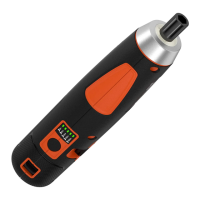ENGLISH
6
BATTERIES AND CHARGERS
The battery is not fully charged out of the box. Before using
the battery and charger, read the safety instructions below
and then follow charging proceduresoutlined. When ordering
replacement batterys, be sure to include the catalog number
andvoltage.
Your tool uses a BLACK+DECKER charger. Be sure to read all
safety instructions before using your charger. Consult the
chart at the end of this manual for compatibility of chargers
and batterypacks.
READ ALL INSTRUCTIONS
Important Safety Instructions for All Batterys
WARNING: Read all safety warnings and all
instructions for the battery, charger and power tool.
Failure to follow the warnings and instructions may
result in electric shock, fire and/or serious injury.
• Do not charge or use the battery in explosive
atmospheres, such as in the presence of flammable
liquids, gases or dust. Inserting or removing the battery
from the charger may ignite the dust orfumes.
• NEVER force the battery into the charger. DO NOT
modify the battery in any way to fit into a non-
compatible charger as battery may rupture causing
serious personal injury. Consult the chart at the end of
this manual for compatibility of batteries andchargers.
• Charge the batterys only in designated
BLACK+DECKERchargers.
• DO NOT splash or immerse in water or otherliquids.
• Do not store or use the tool and battery in locations
where the temperature may reach or exceed 104°F
(40°C) (such as outside sheds or metal buildings in
summer). For best life store batterys in a cool, drylocation.
NOTE: Do not store the batterys in a tool with the
trigger switch locked on. Never tape the trigger switch
in the ONposition.
• Do not incinerate the battery even if it is severely
damaged or is completely worn out. The battery can
explode in a fire. Toxic fumes and materials are created when
lithium ion batterys areburned.
• If battery contents come into contact with the skin,
immediately wash area with mild soap and water. If
battery liquid gets into the eye, rinse water over the open eye
for 15 minutes or until irritation ceases. If medical attention
is needed, the battery electrolyte is composed of a mixture of
liquid organic carbonates and lithiumsalts.
• Contents of opened battery cells may cause
respiratory irritation. Provide fresh air. If symptoms persist,
seek medicalattention.
WARNING: Burn hazard. Battery liquid may be
flammable if exposed to spark orflame.
WARNING: Fire hazard. Never attempt to open the
battery for any reason. If the battery case is cracked or
damaged, do not insert into the charger. Do not crush,
drop or damage the battery. Do not use a battery or
charger that has received a sharp blow, been dropped,
run over or damaged in any way (e.g., pierced with a
nail, hit with a hammer, stepped on). Damaged batterys
should be returned to the service center forrecycling.
Important Safety Instructions for All Battery Chargers
WARNING: Read all safety warnings and all
instructions for the battery, charger and power tool.
Failure to follow the warnings and instructions may
result in electric shock, fire and/or serious injury.
• DO NOT attempt to charge the battery with any chargers
other than the ones in this manual. The charger and battery
are specifically designed to worktogether.
• These chargers are not intended for any uses other than
charging BLACK+DECKERrechargeable batteries. Any other
uses may result in risk of fire, electric shock orelectrocution.
• Do not expose the charger to rain orsnow.
• Pull by the plug rather than the cord when disconnecting the
charger. This will reduce the risk of damage to the electric
plug andcord.
• Make sure that the cord is located so that it will not be
stepped on, tripped over or otherwise subjected to damage
orstress.
• Do not use an extension cord unless it is absolutely
necessary. Use of improper extension cord could result in risk
of fire, electric shock orelectrocution.
• When operating a charger outdoors, always provide a dry
location and use an extension cord suitable for outdoor
use. Use of a cord suitable for outdoor use reduces the risk
of electricshock.
• An extension cord must have adequate wire size (AWG or
American Wire Gauge) for safety. The smaller the gauge
number of the wire, the greater the capacity of the cable,
that is, 16 gauge has more capacity than 18 gauge. An
undersized cord will cause a drop in line voltage resulting
in loss of power and overheating. When using more than
one extension to make up the total length, be sure each
individual extension contains at least the minimum wire size.
The following table shows the correct size to use depending
on cord length and nameplate ampere rating. If in doubt,
use the next heavier gauge. The lower the gauge number,
the heavier thecord.

